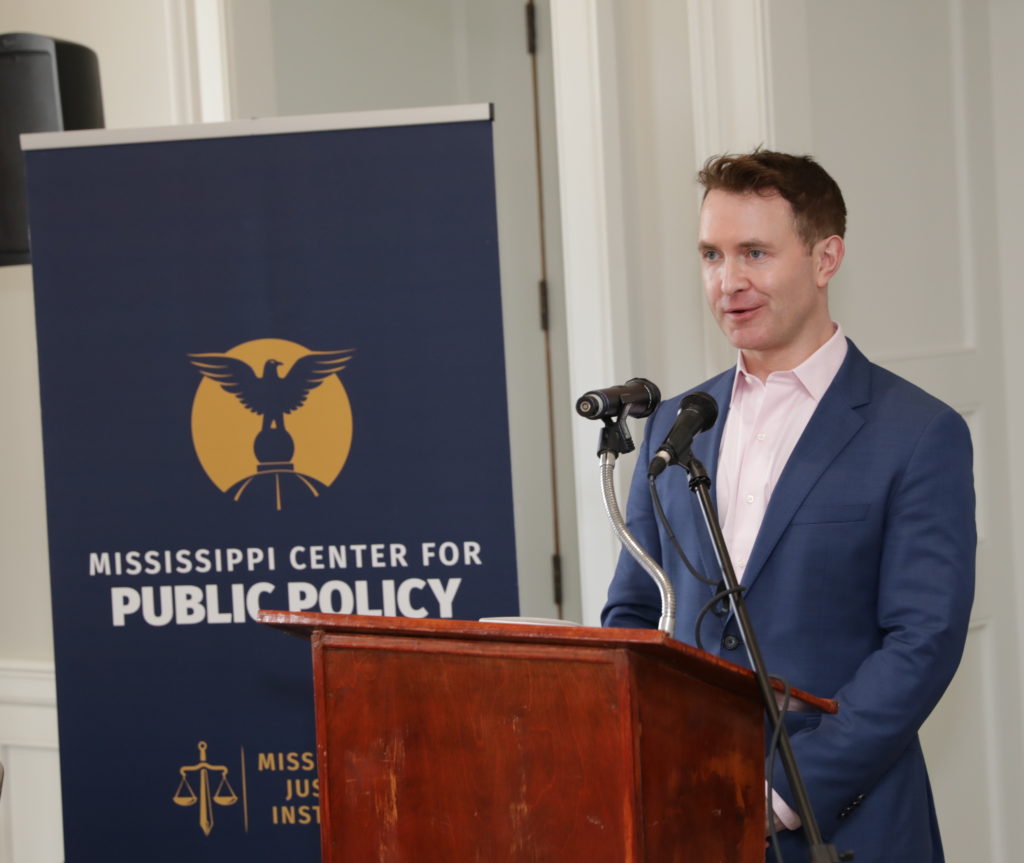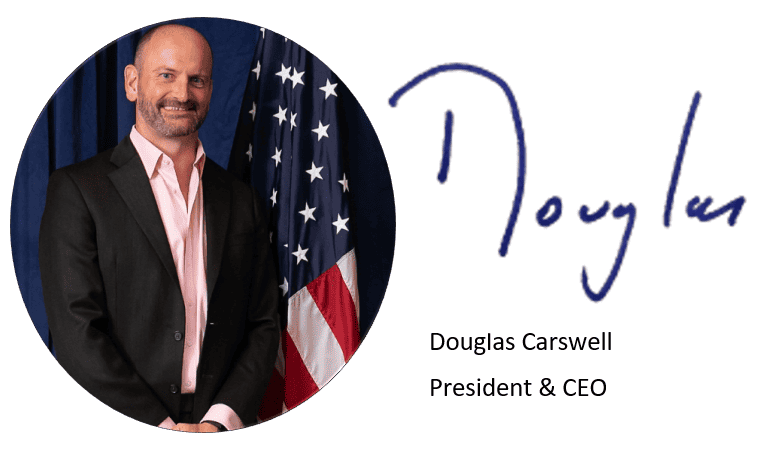Amid the ongoing water crisis in Jackson leaving some people still without clean running water, Hinds County has opted out of trying to receive federal American Rescue Plan Act dollars.
Is this a principled refusal to tackle the DC dollar? Or just incompetence?
The federal government created ARPA in 2021 as a way to help local governments recover from the effects of the COVID-19 pandemic. Its uses include improvements to water, sewer and infrastructure, along with compensating the public sector for lost money.
Mississippi received $1.8 billion in ARPA. Of that amount, the state legislature allocated $750,000 million to help support local governments to match some of the funds local entities have already received from the federal government – $450,000 specifically will be designated for water. To ensure this money was properly spent, the Mississippi Department of Environmental Quality created the Mississippi Municipality & County Water Infrastructure Grant Program for local governments to apply for matching funds with a September 30 deadline.
Hinds County, the county with a failed water system, missed its deadline – intentionally, some suggest.
Hinds County received $45 million in federal ARPA dollars and could have been awarded up to $17 million if the Hinds County Supervisors attempted to apply for these funds. The county’s reasoning for missing the deadline? The hope that sitting out this round could result in more money in the state’s second allocation round in the spring.
But nothing is ever guaranteed, especially when it comes to public money.
The determination of how much matching funds a local entity receives is based upon a point system administered by MDEQ. Hinds County Administrator Kenneth Wayne Jones said the points Hinds County received were not enough to justify even applying for ARPA dollars from the state, and he believes going through the application again and looking for items the county might have initially missed will produce a greater outcome.
In its application, MDEQ states that the process among cities and counties will be very competitive, and some entities may have to apply multiple times before they receive any matching dollars. So even though Hinds County believes it could be allocated more money in the next round, the county is not guaranteed to actually receive these funds.
From soon-to-be college students applying for college tuition assistance to charities looking to fund their mission, any time individuals or organizations request federal dollars, there is always a vigorous and competitive process to receive such aid. The amount of money Hinds County could receive when – or if – it actually applies in the spring may be even less than what the county thought it would secure this go-round, or worse, even none at all.
Based on preliminary data from WLBT Jackson, 429 cities and counties across the state applied for matching dollars, amounting to $435 million in requests. If all desired wants are met, hypothetically, only $15 million remains in the state’s ARPA water improvement fund.
The city of Jackson requested $35 million for work to improve the O. B. Curtis Water Treatment Plant, the facility that oversees Jackson’s water system. Jackson also plans to spend $27 to $35 million of its ARPA received on water upgrades. While the city of Jackson could potentially end up with nearly $70 million to spend on the water crisis, Hinds County will only be contributing a mere $17.5 million to the project, due to not even an attempt to obtain matching funds.
Administrator Jones said he is sure the county’s “strategy” will work in its favor though, eventually resulting in more money later than what could have been offered now. For the betterment of Jackson and Hinds County residents and the need for actually clean water one day, we sure hope so.
Amid the water crisis in Mississippi’s capital city, Jackson has denied its residents once again another basic public service – trash pickup.
Come Saturday, residents will not have garbage collection and will be forced to find other means of disposal. Instead of identifying a sensible solution for residents, Jackson leadership announced Thursday that people should reduce the amount of waste within each household and store seafood waste inside freezers. Residents do have the option to take their garbage to the city’s hazardous waste site, that is if they have the spare time or means necessary to do so.
Over 150,000 people will be affected by this – the same 150,000 who just endured an almost two-month water boil notice and several days without running water.
Jackson began contracting with Richard’s Disposal in April after the contract with the city’s previous disposal group, Waste Management, expired. After much dispute between Jackson Mayor Chokwe Lumumba and the city council, Lumumba issued an emergency contract to Richard’s Disposal, despite it not being approved by the council. The majority of the council wanted to reinstate Waste Management as the city’s service provider, but Lumumba was persistent on contracting with Richard’s due to the lower rates the company offered.
After six months of work, Richard’s Disposal has seen no compensation, and the company, rightly said they have had enough of Jackson’s incompetency. The company also is suing the city for the $5 million it should have received since work began.
Why does a capital city continue to see public needs stripped like this? That would be from poor leadership and elected officials who do not know the meaning of collaboration.
While Lumumba blames the city council for this fiasco, and vice versa, without a legal contract and funds for reimbursement, nothing will be solved for this garbage dilemma. Even though Richard’s has not been paid for its services, Jackson has still been collecting funds from residents for trash pickup, therefore even though the city has the means necessary to pay the company, it just has not done so.
The Mississippi Department of Environmental Quality said that it will fine the city up to $25,000 per day if trash begins to pile up on the side of the road, which could lead to even more debt and problems for Jackson.
So where do we go from here?
The only logical solution is for Lumumba and the city council to attempt to work together. One entity will have to swallow its pride and abandon its stance on who should cover the city’s sanitation and agree to contract with the alternative.
And this can be done. Just recently, Congress found bipartisanship with several legislative measures such as the Violence Against Women Act and a financial reform act for the United States Postal Service. If Congress can find ways to agree, so can a local government.
Councilman Kenneth Stokes, who had previously been against working with Richard’s Disposal, said Thursday he wants the residents to have their trash to be picked up however it needs to be done, so a solution could come sooner, rather than later for Jackson. We just need to hope for a municipal compromise.
Until then, Jackson residents will have to deal with the pungent odors, filthy streetscapes and old shrimp peelings stored in their freezers.
Mississippi’s free-market think tank, the Mississippi Center for Public Policy, won two national awards at the State Policy Network annual conference in Atlanta yesterday.
- 1ST AWARD - “Biggest win for Freedom” award: Earlier this year, Mississippi passed historic tax reform, with the Mississippi Tax Freedom Act. The change cut the state income tax and gave 1.1 million Mississippians a tax break. In recognition of MCPP’s role in achieving this landmark reform, MCPP was given the “Biggest Win for Freedom” Award, jointly with Empower Mississippi.
"Mississippi has historically had a high tax burden and slow growth," said Douglas Carswell, MCPP’s President & CEO. "Our campaign to cut the state income tax is helping to change that."
"We won this award for the work we did to bring key people and organizations into alignment, found common ground for carefully costed state income tax cuts, and at the same time built popular support for the idea.”
- 2ND AWARD - SPN Network Award: In recognition of our effort to overturn the Biden administration’s vaccine mandate, our litigation division, the Mississippi Justice Institute, won the SPN Network Award. We were given the award jointly with a number of other think tanks, including the Texan Public Policy Foundation and Louisiana’s Pelican Institute.
"We are honored to be recognized alongside so many esteemed constitutional litigation centers," said MJI director, Aaron Rice, who helped lead the fight. "We will continue standing up against government overreach and protecting constitutional rights at every opportunity."
The State Policy Network supports a movement of over 60 independent think tanks across America and has over 90 partners. At this year’s conference, SPN gave out five awards. MCPP was a finalist in three of the five categories, going on to win in two.
"It is wonderful that MCPP was a finalist in three of the five categories," Carswell said. "But we like to win for Mississippi, so it was wonderful to go on to actually win twice.
"Mississippi has been one of the poorest states in America for as long as anyone can remember," Carswell said. "MCPP exists to try to change that, and we believe we will only change that by achieving big, strategic changes that improve decades of public policy failure."
"These awards show that MCPP is an effective vehicle for change," Carswell said. "We are helping to drive the far-reaching change that Mississippi needs. Now we want to try to achieve big, strategic wins in improving education and healthcare in our state, too."



An American city of 150,000 people is without running water. Pumps at the main water treatment plant in Jackson, Mississippi failed this week. Low water pressure means that many homes and businesses can’t even run the taps. Those that are getting a trickle are advised not to clean their teeth with it, let alone drink it, since it is likely contaminated.
How did this happen?
Jackson city leadership would like you to think it has something to do with all the recent rains we have had here in Mississippi. Speaking somewhat cryptically at a recent press briefing, Jackson’s mayor, Chokwe Lumumba, said the water-treatment facility had been “challenged, as it relates to these flood levels”. Putting the blame on the rain, he went on to say that the city’s water administration was trying to “figure out how they contend with that additional water that is coming in”.
Officials in neighboring towns and cities, such as Madison, Flowood and Clinton, managed to figure out how to supply residents with clean water despite having just as much rain.
Unless the laws of physics are different in Jackson, the only logical conclusion one can draw from this fiasco is that Jackson’s water problems are a consequence of systemic mismanagement.
Two thousand years ago, the Romans figured out how to supply a city with running water by putting it in pipes. Jackson today seems to be struggling to master this technology.
Key water treatment plants in the city did not employ qualified personnel to run them. Now they have stopped running. What did city authorities think would happen?
For years, city authorities have underinvested in Jackson’s water infrastructure, to the point where it is now falling apart. This, some will be quick to tell you, is because of a lack of money. But why is there not enough money?
In 2017, Jackson’s water billing system collected $61 million in revenue, and the operating costs of the city’s water system were about $54 million. That left a healthy surplus that competent management might have allocated to meet maintenance costs.
This year, the amount of revenue collected is likely to be closer to $40 million, far below running costs. Not only is there no surplus to go towards maintenance, there does not seem to have been much maintenance even when there was a surplus.
How on earth does a city water authority manage to lose almost a third of its revenue in the space of five years? In large part because the city authorities have not collected revenue since they have lacked an effective water billing system.
Several years ago, Siemens was contracted to create a new billing system, while at the same time upgrading much of the city’s dilapidated water infrastructure. That arrangement ended with Siemens being sued by the city for $89 million.
Was that large dollop of Siemens’ money given to the city used to improve Jackson’s water system? Twice as much was spent on attorneys ($30 million) as went to improve Jackson’s water and sewage system ($14 million).
Given what happened with Siemens, I worry that Jackson might not be able to find a contractor willing to undertake the herculean task of fixing the city’s water supply, even if the money could be found. I also suspect that any large outside contractor prepared to undertake the task may want to ensure that they were free to subcontract with their preferred partners on the basis of value, and not to be subjected to various ‘contract rules’ on the basis of politics.
Without some sort of outside support, Jackson’s water crisis will not be resolved. Our’s may become the first state capital in America where it becomes impossible for residents to take a daily shower.
At the state level, Mississippi’s Governor Tate Reeves, who lives in Jackson, has stepped in. He has taken on the task of providing emergency water distribution to local residents – and offering state money to pay for half of it.
The federal government also seems keen to help out. President Biden specifically mentioned investing in Jackson’s water system, during the passage of the Infrastructure Bill. But as Representative Bennie Thompson has sensibly suggested, for the federal authorities to step in “the city to come up with a plan”. Representative Thompson is right.
The federal and state authorities seem willing to act. The key question is whether Jackson’s city leadership is willing to let them come in alongside.
Douglas Carswell is the President & CEO of the Mississippi Center for Public Policy. He lives and works in Jackson.
Since moving across the Atlantic to run the Mississippi Center for Public Policy, I have led successful campaigns to:
• Cut the state income tax, resulting in both the largest tax cut in Mississippi history and a flat tax.
• Enact a law to combat Critical Race theory consistent with liberty.
• Reform occupational licensing, making it easier for skilled people to work here.
Low tax, liberty max – this is what real conservatism looks like. If only folk back in Britain were offered real conservatism!
In recognition of our success in building a mass movement that made these wins possible, the Mississippi Center for Public Policy has been nominated for an award – but we need your support to win.
Please vote to make sure Mississippi wins!
Thank you!
(Jackson, MS): The Mississippi Center for Public Policy has hired Michelle Brodsky as its new Investigative Researcher/Journalist
Michelle Brodsky, a native of Pennsylvania, will serve as the Mississippi Center for Public Policy’s new Investigative Researcher/Journalist. Through this position, she will conduct primary research on energy policy, healthcare and education and works with the Director of Communications to assemble her findings in a cohesive and succinct manner.
Michelle is a graduate of the University of Hartford where she studied history, psychology, and economics, launching her journey in conservative politics. She will be attending Cornell Law School this coming fall and hopes to eventually become a criminal defense attorney or a civil rights attorney.
“Michelle is a first-class writer who will produce in-depth research and analysis," CEO & President Douglas Carswell said. "I am excited to have her as part of our team, taking on the cozy cartels that hold our state back and advancing the cause of liberty.”
Monday was Michelle’s first day on the job. She will primarily be working virtually. Her first research article, published Thursday, can be found here.
As a first-generation American whose parents escaped the communism of the former USSR, Michelle is particularly passionate about ensuring that the United States does not end up like the former Soviet Union. Along with freedom of speech and gun rights, Michelle's top issues are school choice, education reform and election integrity.
“I am really excited to work for MCPP as an investigative reporter because I will have the opportunity to conduct primary research on issues that deeply affect all Mississippians and Americans,” Brodsky said. “In a world that relies on sound bites, it has become increasingly important to dive into the facts and draw original conclusions.”

Read a letter to Mississippi elected officials, sponsored by several of the state's think tanks, alliances and unions, on the need for income tax elimination here.
Mississippi’s administrative state has a major democratic deficit, according to a new report published today.
Of the 222 state government bureaucracies reviewed in the report, only 5 percent are headed by a directly elected official. The state Senate only confirms a small minority of appointees to other key positions.
According to the report, published by the Mississippi Center for Public Policy, the administrative state in Mississippi has the ability to spend money and decide on public policy without reference to the public. 81% of bureaucratic spending comes from agencies run by appointed leaders with very little regulatory accountability.
The report acknowledges that certain departments or boards are essential to the success of Mississippi, but that there are dozens of agencies the state could probably do without. Might not Mississippi be able to manage without an Interior Design Advisory Committee?
“When people talk about ‘draining the swamp,’ they usually mean Washington D.C.,” explained CEO & President Douglas Carswell. “Our research shows that there is a ‘swamp’ here in Mississippi that needs dealing with, too.”
In order to assess the entire administrative state of Mississippi, we analyzed four elements of 222 state boards, agencies and commissions: accountability, spending power and size, regulatory power and function. Our findings reveal that while much of the state bureaucracy is unaccountable, it is well-resourced and has expanded in terms of its regulatory remit.
“We reviewed 222 state-based bureaucratic organizations here in Mississippi, and we discovered that there is a serious accountability deficit,” Carswell said. “Big, powerful bureaucratic organizations are able to impose rules and spend public money without meaningful accountability to the public.”
What should we do about the administrative state of Mississippi? How can we hold these bureaucrats accountable, and how can we better manage the regulations and functionality of these boards? We at the Mississippi Center for Public Policy have some suggestions.
1. Rein in the broad discretion given to bureaucrats by laying out parameters for regulations and requiring routine audits
2. Establish more grassroots accountability through elections by expanding the amount of elected, rather than appointed agency representatives
3. Look at the possibility of term limits for high-level officials to help remove the problems that can come from a system of career-centered bureaucrats
4. Consolidate or eliminate certain entities to save taxpayer dollars
5. Put in a sunset provision that requires any new regulation to be automatically repealed after a certain period of time if not extended, in order to eliminate the overbearing regulatory authority
6. Require all unelected regulators to submit annual public reports to the legislature outlining enforcement actions, subjecting these entities to higher scrutiny
The Mississippi Center for Public Policy believes “draining the swamp” would have a positive impact on the state by eliminating unnecessary agencies that negatively hold back citizens, while also ensuring those in power do not have an overabundance of money and control.
You can read the full report here.
For media inquiries, please contact Tyler B. Jones, [email protected].
Douglas Murray spoke to a packed meeting at River Hills Club in Jackson, Mississippi yesterday.
Murray’s new book, War on the West, was announced as a New York Times bestseller the day he landed in Jackson. His book was already the number one selling hardback book in his native Britain the previous week.
“Douglas Murray is the man of the moment. His book is a best seller and I believe is proving to be extremely influential in shaping the way America thinks” said Douglas Carswell, President & CEO of the Mississippi Center for Public Policy, which hosted the event.
“In recent years, Americans have been told that they must feel bad about their country. Progressive professors have taught young Americans that America is always wrong.”
“Heroic figures from America’s past have been denigrated. Statues have been pulled down by the mob. In the name of equity, millions of ordinary Americans get treated unequally.”
“Douglas Murray’s new book uses clear, well-researched insights to show how absurd these ‘woke’ ideas actually are. And he shows how Americans can stand proud”.



